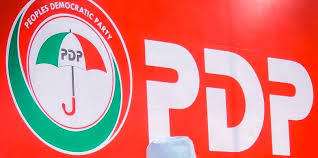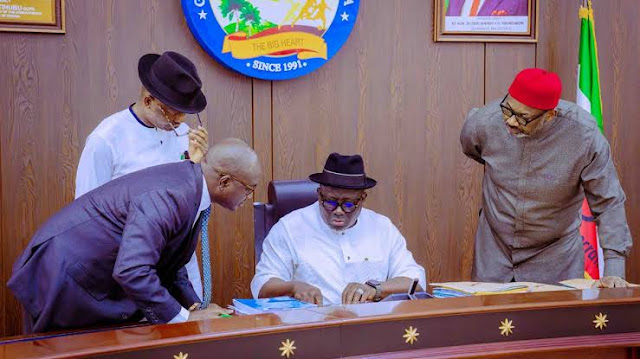In a strategic move aimed at revitalizing its organizational framework and preparing for upcoming political engagements, the People’s Democratic Party (PDP) in Cross River State has inaugurated a 20-member Congress Committee. This development, announced during a formal gathering at the party’s state secretariat in Calabar, underscores the PDP’s commitment to internal democracy, transparency, and grassroots mobilization in one of Nigeria’s key southern states. The committee’s formation comes at a critical juncture for the party, as it seeks to consolidate its position ahead of local elections, gubernatorial races, and national conventions. With Nigeria’s political landscape heating up in September 2025, this initiative reflects the PDP’s broader efforts to address internal challenges and reclaim electoral dominance in Cross River, a state historically contested between the ruling All Progressives Congress (APC) and opposition forces.
The inauguration ceremony, held under the auspices of the PDP National Working Committee (NWC), was attended by party stalwarts, local government chairmen, youth leaders, and women representatives from across the state’s 18 local government areas. It served not only as a launchpad for the committee but also as a platform for reaffirming unity and resolving lingering disputes from previous congresses. Cross River State, known for its lush rainforests, coastal beauty, and economic potential in oil, agriculture, and tourism, has been a battleground for political parties since the return to democracy in 1999. The PDP, which governed the state for several terms under figures like former Governor Liyel Imoke, has faced setbacks in recent years, including the APC’s victory in the 2023 gubernatorial election. The new committee is seen as a deliberate step to rebuild the party’s machinery, ensuring that ward, local, and state congresses are conducted with utmost integrity and inclusivity.
Background on the PDP’s Political Trajectory in Cross River State
To fully appreciate the significance of this 20-member committee, it is essential to contextualize the PDP’s journey in Cross River State. Established in 1998 as a merger of several progressive groups, the PDP quickly became Nigeria’s dominant party, controlling the presidency and most states during the Fourth Republic’s early years. In Cross River, the party rode on the waves of federal patronage and local development projects to secure victories in 1999, 2003, 2007, and 2011 gubernatorial elections. Under Governors Donald Duke (1999-2007) and Liyel Imoke (2007-2015), the state witnessed landmark initiatives such as the Carnival Calabar, which boosted tourism, and infrastructure projects like the dualization of major highways connecting Calabar to the northern parts of the state.
However, the PDP’s fortunes waned in the 2015 elections when the APC capitalized on national anti-incumbency sentiments and internal PDP squabbles to wrest power. The defection of key figures, including former Governor Ben Ayade to the APC in 2021, further eroded the party’s base. Ayade’s administration, marked by ambitious but controversial projects like the Bakassi Deep Seaport and the Superhighway, left a mixed legacy of debt and unfinished developments. The PDP’s loss in the 2023 elections, where APC’s Bassey Otu emerged victorious, highlighted organizational weaknesses, including voter apathy, funding shortages, and allegations of electoral malpractices favoring the ruling party.
As of September 2025, the PDP in Cross River is navigating a resurgence phase. National party leaders, including Acting National Chairman Umar Iliya Damagum, have emphasized the need for state chapters to conduct regular congresses to elect credible executives. This aligns with the PDP’s constitution, which mandates periodic congresses at ward, local government, and state levels to ensure democratic renewal. Previous congresses in Cross River have been marred by litigation, with factions accusing each other of imposition and exclusion. The formation of this committee is thus a proactive measure to preempt such issues, fostering a unified front as the party eyes the 2027 general elections.
Cross River’s demographic and geographic diversity adds layers to the PDP’s strategy. The state comprises three senatorial districts: Northern (with agricultural hubs like Ogoja and Obudu), Central (including the capital Calabar and urban centers), and Southern (encompassing oil-producing areas like Bakassi and Calabar South). Ethnic groups such as the Efik, Ejagham, and Bekwarra bring varied interests, making inclusive representation crucial. The PDP’s committee formation addresses this by drawing members from all districts, genders, and youth segments, signaling a commitment to equity.
Composition and Leadership of the 20-Member Congress Committee
The 20-member Congress Committee is a carefully curated body designed to oversee the planning, execution, and supervision of party congresses across Cross River State. Led by a chairman with deep organizational experience, the committee includes representatives from the party’s National Secretariat, state executives, and affiliate groups such as the PDP Youth Frontier and Women Wing. While specific names were disclosed during the inauguration, the selection process involved consultations with zonal leaders to ensure balance.
At the helm is the Chairman, a seasoned PDP operative from the Central Senatorial District, tasked with coordinating logistics, timelines, and compliance with INEC guidelines. The Vice Chairman, hailing from the Northern District, brings expertise in grassroots mobilization, having previously served as a local government chairman. The Secretary, a legal practitioner from the Southern District, is responsible for documentation, dispute resolution, and legal advisory. Other key members include financial secretaries to manage budgets, publicity officers for media engagement, and security coordinators to ensure peaceful conduct during congresses.
The committee’s composition reflects the PDP’s emphasis on diversity: eight members are from the youth wing (under 40 years old), six from the women wing, and the rest from elder statesmen and technocrats. This mix aims to inject fresh energy while leveraging institutional memory. Members were sworn in with oaths of allegiance to the party’s ideals of unity, fairness, and progress. The inauguration featured addresses from national representatives, who urged the committee to prioritize transparency, such as open nominations and electronic voting where feasible.
The committee’s mandate is multifaceted. Primarily, it will organize ward congresses within the next three months, followed by local government congresses, culminating in the state congress by early 2026. These events will elect executives who will steer the party through the 2027 elections. Additionally, the committee is empowered to reconcile aggrieved members, audit past congress records, and recommend reforms to the state executive. Funding for the committee comes from party dues, donations, and national allocations, with a commitment to judicious use amid Nigeria’s economic pressures.
Objectives and Strategic Importance of the Committee
The establishment of this committee is not merely procedural; it is a cornerstone of the PDP’s revival strategy in Cross River. One primary objective is to enhance internal democracy, a recurring demand from party members and observers. Past congresses have been criticized for “godfatherism,” where influential politicians impose candidates, leading to boycotts and court cases. The committee’s guidelines mandate primaries based on universal suffrage, with delegates selected via transparent lotteries or elections at the polling unit level. This approach is intended to empower ordinary members, particularly in rural areas like Abi and Etung LGAs, where voter turnout has historically been low.
Another key goal is conflict resolution. Cross River PDP has been factionalized, with groups loyal to former governors Duke, Imoke, and Ayade pulling in different directions. The committee includes neutral arbitrators to mediate, drawing on the PDP’s National Reconciliation Committee model. Successful reconciliations could see returnees from the APC bolstering the party’s ranks, especially in the Southern District where oil politics plays a role.
Electoral preparedness is paramount. With the 2027 elections looming, the committee will align congress outcomes with campaign strategies. This includes zoning formulas for elective positions—rotating gubernatorial candidacies among districts to promote equity—and youth quotas to attract millennial voters disillusioned by unemployment and insecurity. The PDP aims to leverage Cross River’s economic assets: its status as an oil-producing state entitles it to 13% derivation funds, which the party promises to channel into education, health, and infrastructure if it regains power.
On a national scale, the committee’s work feeds into the PDP’s overarching agenda under President Bola Tinubu’s administration (noting the APC’s hold). The opposition PDP seeks to position itself as a viable alternative, criticizing federal policies on fuel subsidy removal and naira floating while showcasing state-level successes. In Cross River, this translates to campaigns highlighting neglected federal projects like the Calabar-Ikom highway and advocating for blue economy initiatives in the Bakassi Peninsula.
Reactions from Stakeholders and Party Members
The inauguration elicited positive reactions across the political spectrum. State PDP Chairman, in his remarks, described the committee as a “game-changer” for reclaiming lost grounds. “This is our moment to rebuild from the wards up,” he stated, emphasizing the need for vigilance against infiltration by opposition agents. Youth leaders welcomed the inclusion of young members, viewing it as validation of their role in decision-making. A female representative from the Women Wing praised the gender balance, noting it aligns with the PDP’s 35% affirmative action policy.
Opposition voices, including APC chieftains, downplayed the move, calling it “too little, too late.” However, analysts see it as a smart repositioning. Civil society organizations like the Yiaga Africa election watchdog commended the transparency pledge, urging live-streaming of congresses. Media coverage in outlets like Nigerian News Direct highlighted the event’s peaceful conduct, contrasting it with past violent clashes.
Community responses varied by district. In the Northern Senatorial District, farmers and traders expressed hope that stronger PDP leadership would revive agricultural subsidies. Southern residents, affected by militancy and boundary disputes, anticipate security-focused platforms. Urban Calabar dwellers focused on tourism revival, linking it to party unity.
Challenges Ahead and Mitigation Strategies
Despite the optimism, the committee faces hurdles. Funding remains a perennial issue; with inflation at record highs in 2025, party finances are strained. The committee plans to launch fundraising drives, targeting diaspora Cross Riverians. Logistical challenges in remote areas like Obanliku LGA, with poor roads and insecurity from herdsmen-farmer clashes, require partnerships with security agencies.
Legal challenges loom, as dissatisfied factions may seek injunctions. The committee’s legal team is prepared to defend processes in court, emphasizing adherence to the Electoral Act 2022. Inclusivity is another concern; ensuring minority ethnic groups like the Korup are represented prevents alienation.
To mitigate these, the committee has outlined a roadmap: sensitization workshops, digital registration portals, and monitoring teams comprising INEC observers. Collaboration with national bodies will provide oversight, while anti-corruption measures like asset declarations for executives deter graft.
Broader Implications for Nigerian Politics
This initiative in Cross River has ripple effects on Nigeria’s political ecosystem. The PDP’s success here could inspire other states like Rivers and Akwa Ibom, where similar factionalisms persist. Nationally, it bolsters the opposition’s narrative of reform, pressuring the APC on governance. As Nigeria approaches its 2027 polls, with issues like economic recession and insecurity dominating, parties like PDP must demonstrate organizational prowess.
Cross River’s committee also highlights the role of subnational politics in federal dynamics. The state’s strategic location—bordering Cameroon and hosting key ports—makes it vital for trade and security policies. A unified PDP could influence debates on resource control, environmental degradation from oil spills, and climate resilience in the face of flooding.
Future Outlook and PDP’s Vision for Cross River
Looking forward, the committee envisions a PDP-led Cross River characterized by inclusive growth. Priorities include youth employment through agro-industrial hubs, women’s empowerment via microfinance, and sustainable tourism leveraging the Obudu Cattle Ranch and Tinapa Resort. The party pledges to tackle unemployment, currently at 33% statewide, by advocating for industrial revivals.
As congresses unfold, monitoring progress will be key. Success metrics include high turnout, minimal litigation, and elected executives reflecting diversity. By 2026, the PDP aims for a congress that not only elects leaders but galvanizes support for 2027 victories.
In conclusion, the PDP’s 20-member Congress Committee in Cross River State represents a pivotal chapter in the party’s narrative of resilience and renewal. Amidst national challenges, this body stands as a testament to the power of organized opposition. By fostering democracy at the grassroots, the PDP is not just preparing for elections but building a legacy of accountable governance. For Cross Riverians, it offers hope for a future where political unity translates into tangible development, ensuring the state’s potential is fully realized in Nigeria’s democratic journey.






